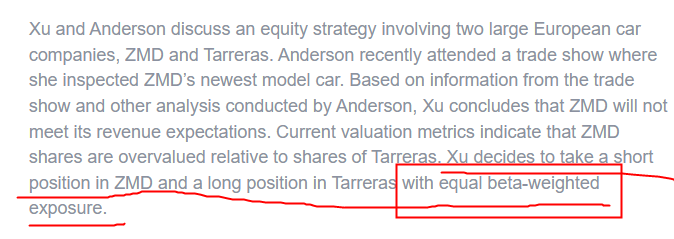NO.PZ201909280100001004
问题如下:
Which equity hedge fund strategy best describes the
ZMD and Tarreras positions taken by Xu?
选项:
A.Short bias B.Long/short equity C.Equity market neutral
解释:
C is correct. Xu’s decision to short ZMD and take a long
position in Tarreras with equal beta-weighted exposure is an example of a pairs
trade or an equity-market-neutral strategy. Xu is neutralizing market risk by
constructing a strategy where the expected portfolio beta is zero. Since her
strategy does not take beta risk and attempts to neutralize many other factor
risks, Xu must apply leverage to the long and short positions to achieve a
meaningful expected return from the stock selection.
A is incorrect because in a short-biased hedge fund
strategy, the manager aims to sell expensively priced equities but may balance
the short exposure with some modest long exposure. Xu, however, has entered
into an equity-market-neutral pairs trade that takes opposite long and short
positions in an attempt to eliminate market exposure. Her positions do not have
a short bias.
B is incorrect because long/short equity managers buy
equities of companies they expect will rise and sell short equities of
companies they believe will fall in value. When long and short positions are
placed together into a portfolio, the market exposure is the net of the
beta-adjusted long and short exposures; however, the target beta is typically
not zero. Xu is neutralizing market risk by constructing a strategy where the
expected portfolio beta is zero.
C是正确的。 xu决定做空 Z 并在 T 中持有相同的 beta 加权敞口的多头头寸是配对交易或股票市场中性策略的一个例子。 xu 通过构建预期投资组合 Beta 为零的策略来抵消市场风险。由于她的策略不承担贝塔风险并试图抵消许多其他因素风险,xu必须对多头和空头头寸应用杠杆,以从选股中获得有意义的预期回报。
A 不正确,因为在偏向空头的对冲基金策略中,经理旨在出售价格昂贵的股票,但可能会在空头敞口与一些适度的长头敞口之间取得平衡。然而,xu已进入股票市场中性配对交易,该交易采取相反的多头和空头头寸,试图消除市场敞口。她的仓位没有空头倾向。
B 是不正确的,因为多头/空头股票经理买入他们预期会上涨的公司的股票,并卖出他们认为价值会下跌的公司的股票。当多头头寸和空头头寸一起放入投资组合时,市场敞口是经贝塔调整的多头和空头敞口的净值;然而,目标贝塔值通常不为零。 xu 通过构建预期投资组合 Beta 为零的策略来抵消市场风险。
如题





